Greetings, I’m MW, and it just happened that the one who works on the magic system is me. So, apparently, I must initiate you to the mysteries of whatever I’ve been doing for a year.
Magic Schools
Since we decided to base our system of magic on the chronicles, there are 6 Cosmic Forces that we implement: Light, Shadow, Chaos, Order, Life, Death; and 4 elements: Fire, Water, Air, Earth.
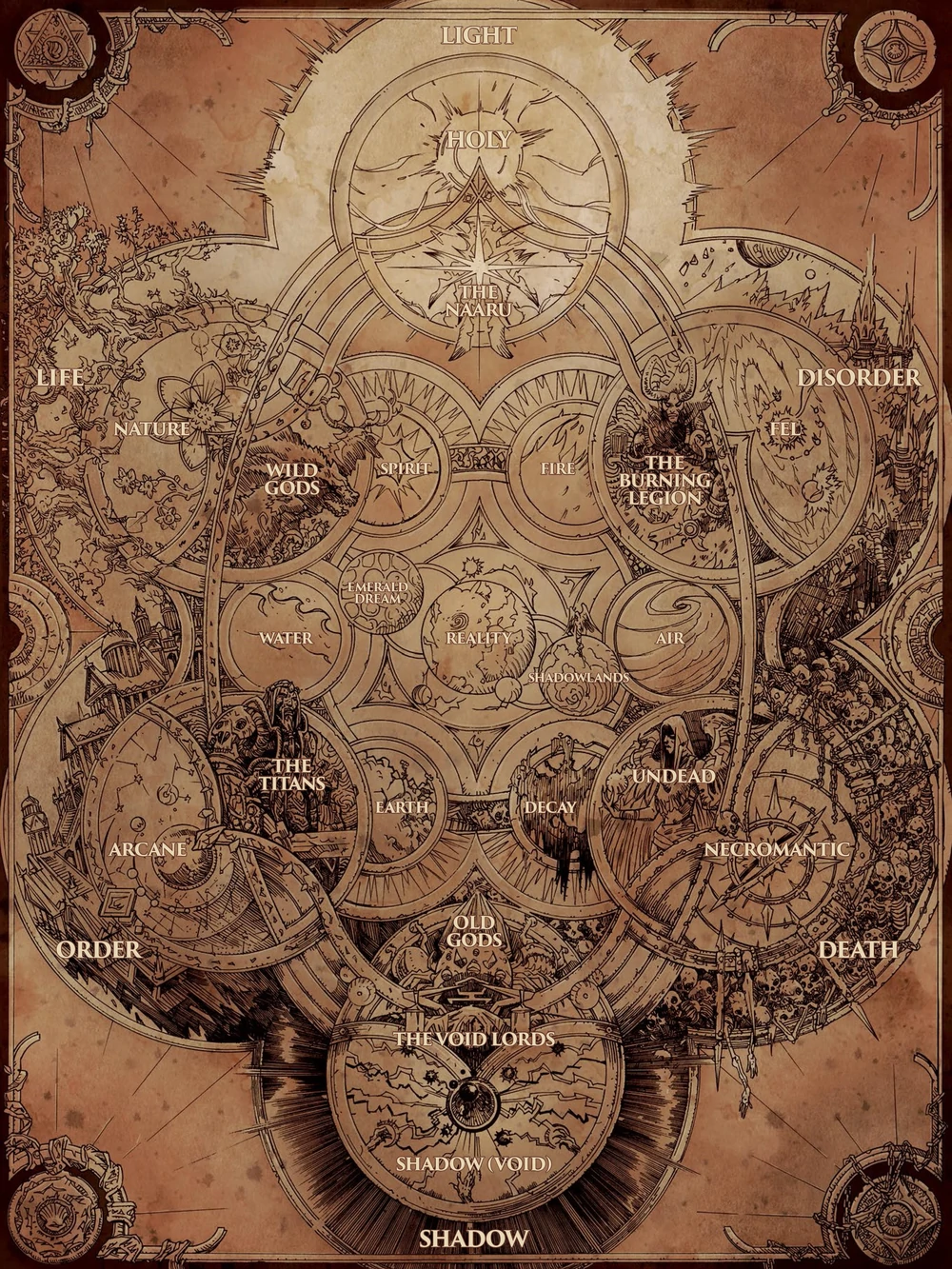
There is neither “Spirit” nor “Decay” among the listed types of magic - they are not separate types of magic, but we will come back to them later - and to how the fifth and the six elements are interacting with the first four.
Lifestyles
We plan to make magic lifestyles - one per type of magic. They will be an addition to the vanilla 5 lifestyles, so if you wish to, you can completely ignore all magic and roleplay a ruler, like Terenas, who is neither a warrior nor a mage.
Six cosmic forces were represented like that:
- Light - Light Magic, illuminating the thorny road to paladins, priests, moonpriestesses, sunwalkers and many more.
- Shadow - Shadow Magic, hiding in the dark not only for the servants of the Old Gods, but also its less radical adepts - shadow priests and shadowhunters.
- Chaos - Fel Magic, sacrificial magic, which gives immense power to demons and warlocks practicing it.
- Order - Arcane Magic, lifting the veiled secrets of magic to those who are diligent in their search for it.
- Life - Nature Magic, known for its calmness yet ferocious. Wielded by wise and savage druids who follow the path of the Ancients.
- Death - Death Magic, loved by necromancers for its claws that firmly hold the souls of the deceased and not letting the dead travel to the other side.
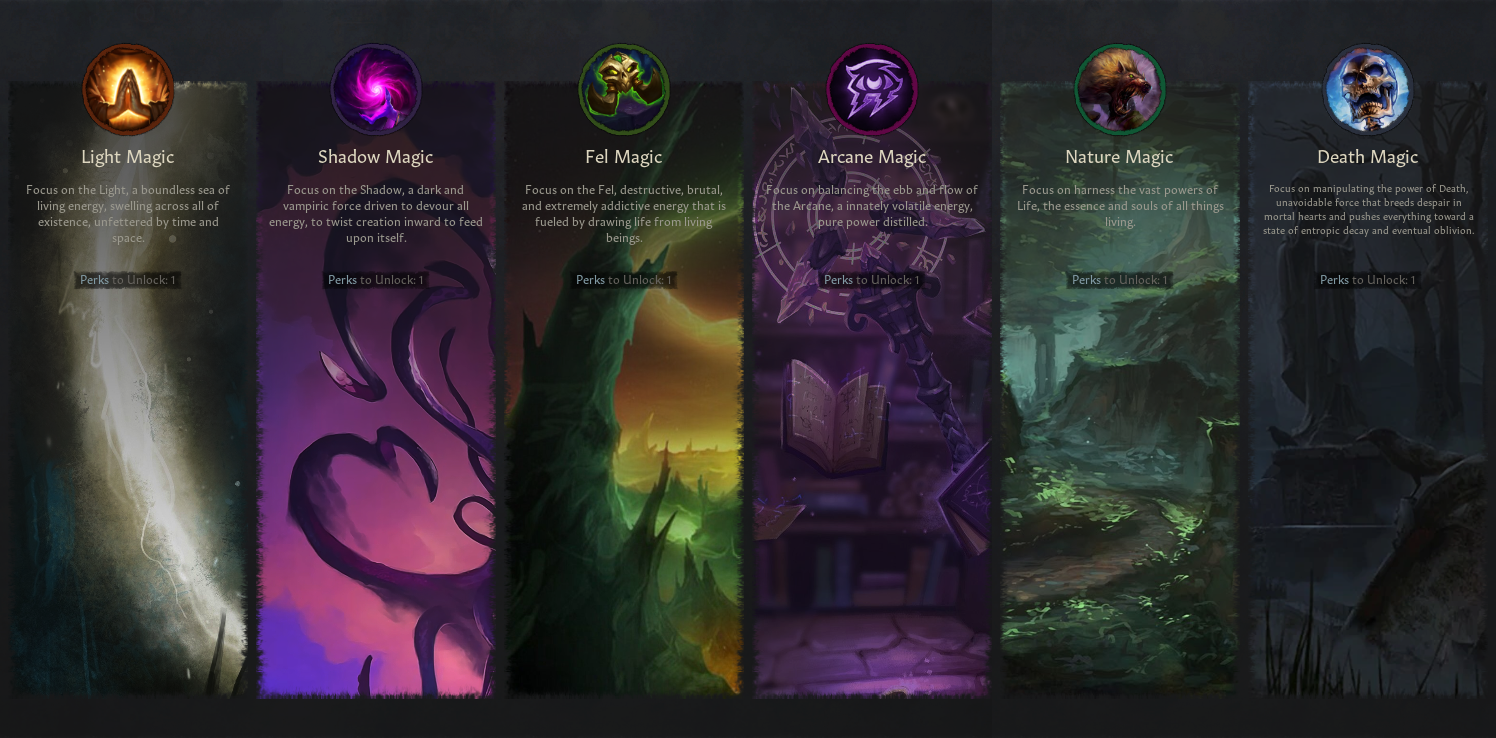
Elemental Magics are used by monks, shamans (dark and not), and even mages. They are pretty straightforward and correspond with 4 elements - Fire Magic, Water Magic, Air Magic and Earth Magic.
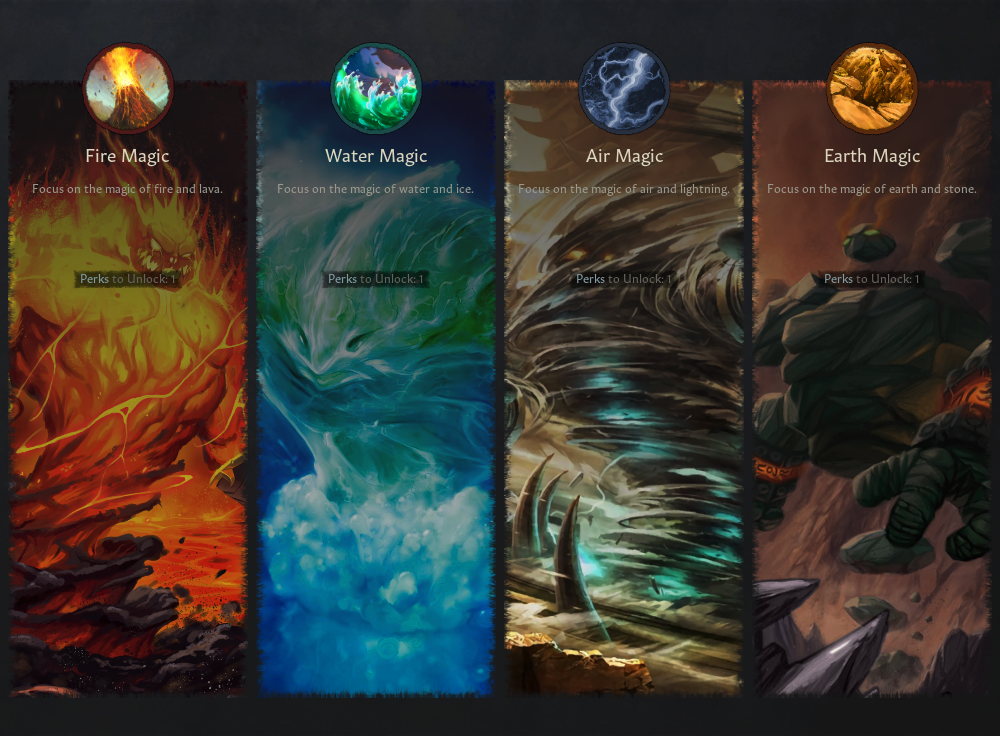
We decided to make the class system modular - for example, frost mages will combine water and arcane magics, while fire mages will combine fire and arcane.
Let's look at them a little bit closer. One of the first things you will notice is that magic lifestyles don’t follow the vanilla pattern of giving character a trait for finishing a perk tree. Instead, the character gets a trait when they unlock a perk in the lifestyle. As the character unlock more lifestyle perks, their traits will be upgraded.
These traits will decide how other characters might perceive them. - I’ll talk about that in detail a bit further.
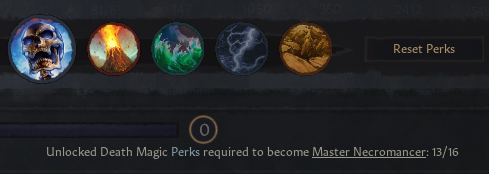
Perk trees in the new magic lifestyles are too early in the development, thus not ready to be shown yet. However, it also means that if you have an idea for a perk you want us to implement, you can send your idea through this Google Form.
Skipping the perk trees, lets look at the perks itself. We plan that some perks will give access to new Spells,
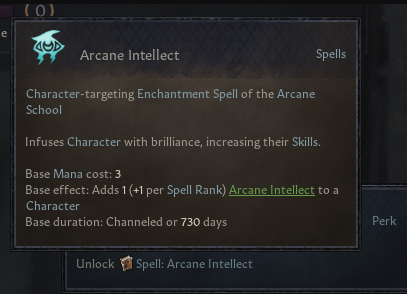
while some others will upgrade already existing perks.
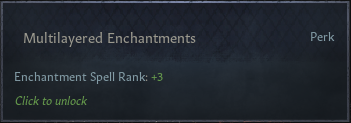
However, you will need Mana to cast them.
Mana
In order to use magic, we added a new resource - Mana. You can find its amount, maximum, and monthly regeneration value in the resources HUD or in the character window, when you hover over a character’s mana value.

Perks in magical lifestyles have a side-effect: they increase Maximum Mana.

It’s up to you how to spend it - you may spend it on whatever spell you may cast,
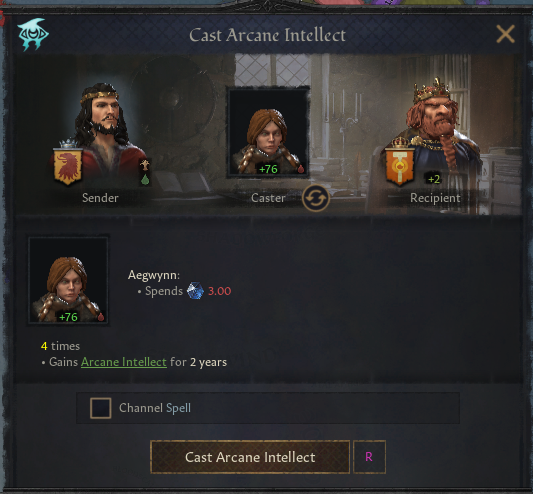
I’m still working on the spellcasting system itself, so it’s one of a couple working spells I can actually show you.
…or don’t spend it at all - also a legitimate strategy, as your character may benefit from unspent mana too. For example, increasing Mana Conductivity may lead the character into receiving more prowess from available mana.
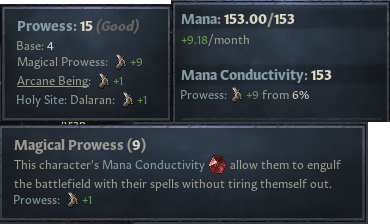
If you are wondering what the Channeling option is - that’s QoL for players who like to cast buffs on characters, but don’t want to renew them every few years. We plan to make Channeling Spells whose effect is active until the caster stops channeling it, or becomes unable to channel it anymore.
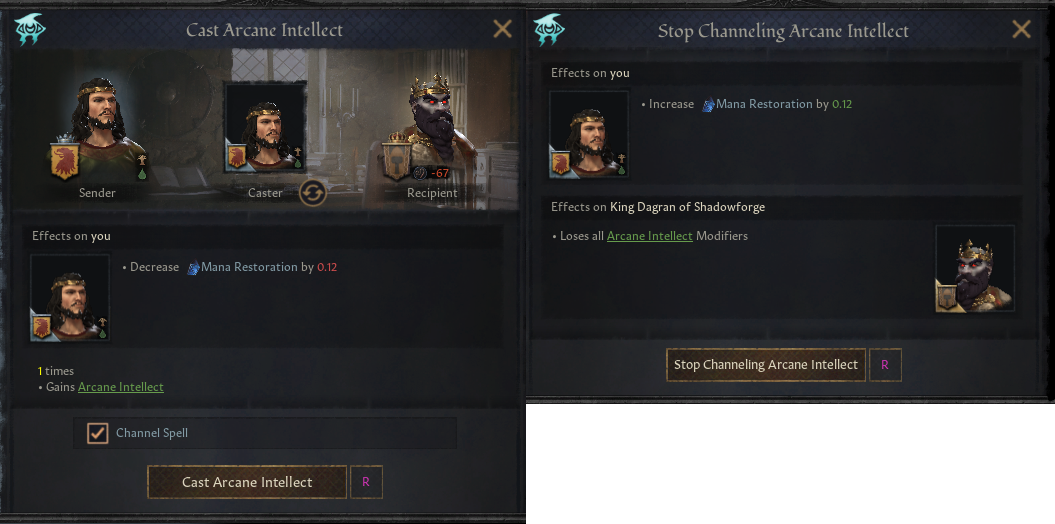
Elemental Goodwill
Elemental lifestyles deserve another word about them.
They will have a special mechanic to determine a character’s relationship with the elementals.

To show the difference between Spirit and Decay (about which was mentioned briefly with magic schools), we created an Elemental Goodwill mechanic. We plan to use it extensively in elemental magic lifestyles events and spells. The idea behind it is simple - if you are friendly with the elements, your character has high goodwill, which makes them a shaman. A shaman is respected by those who venerate the elements, and use Spirit to commune with the ever raging primordial forces.
Your character prefers to subdue elements instead? It will certainly lower goodwill, making them a dark shaman. Dark shaman is not very liked by those who use Spirit to venerate the elements, but would be respected by those faiths that use Decay to venerate them.
Maybe your character is not too radical in either way, not enslaving nor serving the elements, but instead controlling and regulating these chaotic forces? Then they may become a mage.

Depending on idolising doctrine, actions of (dark) shamans may be viewed as pious or impious. Think twice before asking for help, subjugating, or helping the elements.
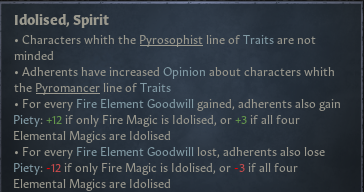

Three traits - one for shamans and monks, one for mages, one for dark shamans
Wai-wai-wait, doctrines? Yeah, doctrines.
Doctrines
Each faith has magical doctrines that regulate how adherents of the faith look at magic users, and what focuses in magic lifestyles adherents can choose.
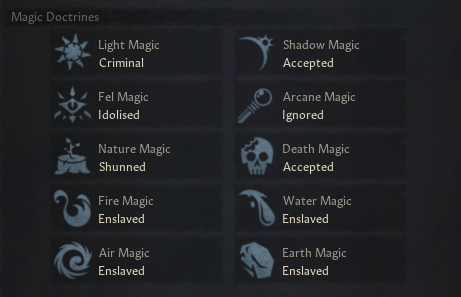
Each cosmic force has its own doctrine with 5 possible variations.
I’ll make a quick remark about ones that are very similar to vanilla criminal doctrines:
- Criminal - characters with traits from the corresponding magical lifestyle will be regarded as criminals that you can imprison and even execute.
- Shunned - adherents will not imprison you, but won’t love you very much either.
- Accepted - no negative opinion about characters with this magical trait. This is also one of two doctrines that allows characters to learn magic by default.
About the other two…
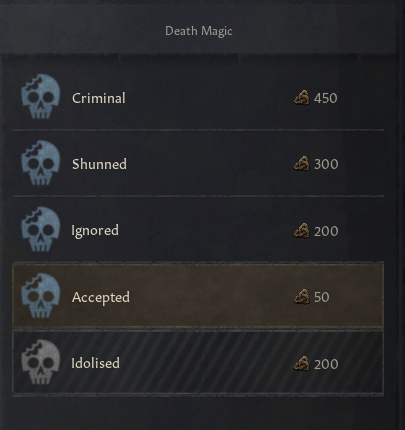
Ignored, a faith with that doctrine variant doesn't see anything extremely shameful in practicing that type of magic, but also doesn't value it. Characters without prior experience or outside help will find it very difficult to start learning it, as they will have no default access to focus in this magic lifestyle. However, if they manage to learn how to wield that magic, adherents from this faith wouldn't mind that.
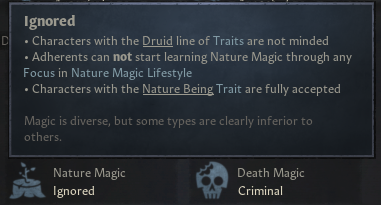
Idolising maybe would not raise the mages to the rank of the divine, but it’ll at least give them some respect from the masses. The higher their magical trait level is - the more respect they gain. A faith can have only one Idolised cosmic force, but elements are a bit different in that matter…

Each elemental force has their own doctrine with 8 possible variations. Accepting doctrine is divided into 3 new ones: Controlled, Harmonized, and Enslaved. Idolizing into 2: Idolised, Spirit and Idolised, Decay.
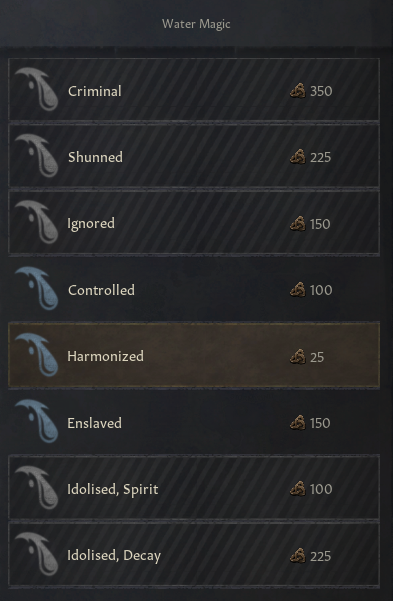
Two variations of idolised magic - Spirit and Decay - represent faith’s opinion for interaction with the elements - as we already talked about Elemental Goodwill earlier.
Unlike with the cosmic forces, you can have one or four idolised elemental magics.
For example, those who serve Ragnaros or Theradras could have only one idolised magic.
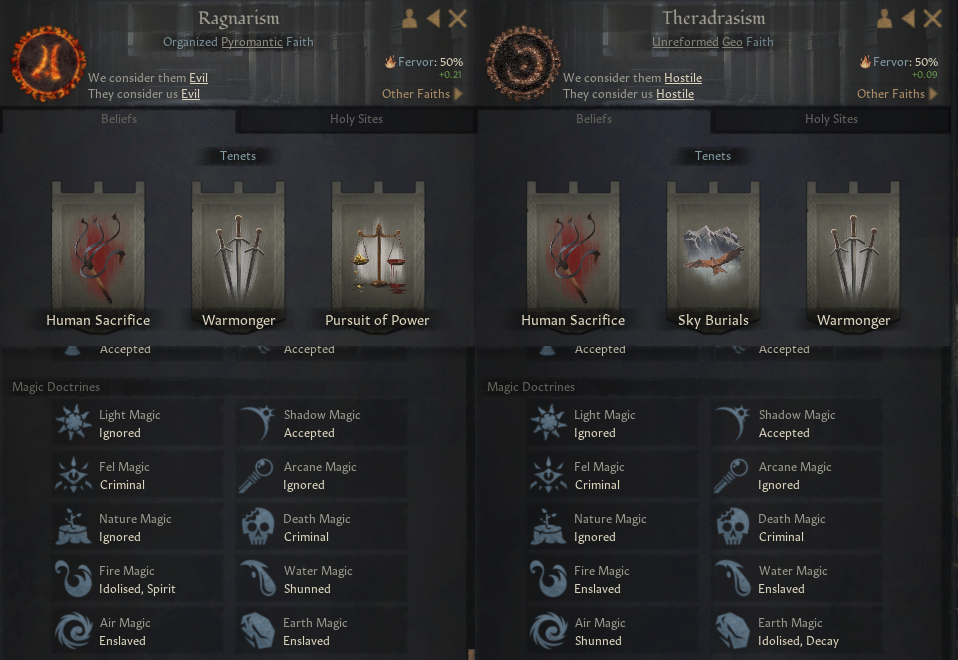
While taunkas and orcs venerate all the elements.
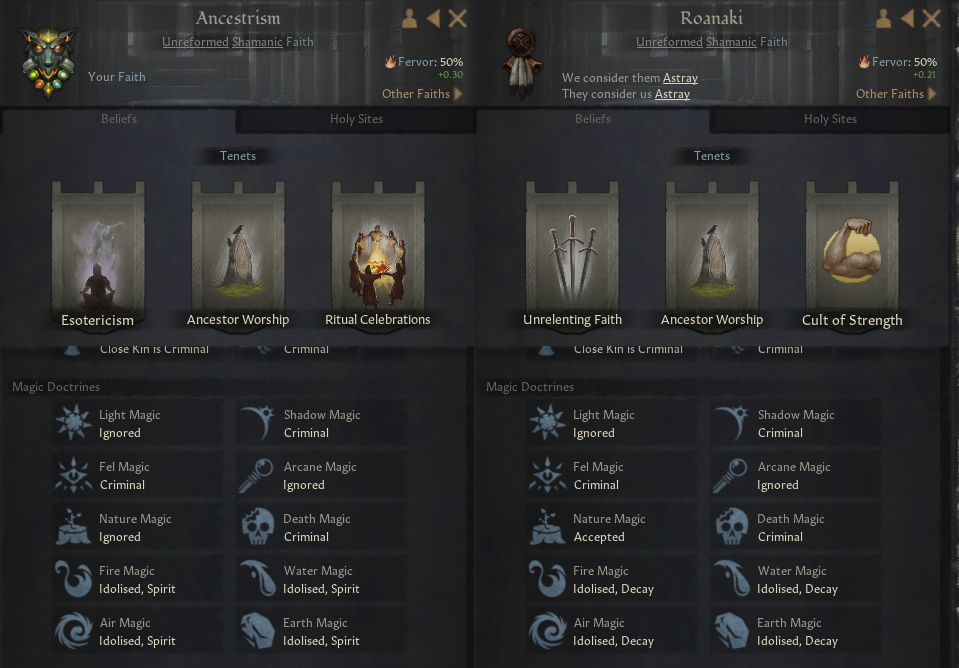
Let’s look at three elemental doctrines that the accepted doctrines were divided into:
- Harmonized, that is used by faiths where shamans and/or monks use the fifth element, spirit, to live in harmony with elements, but do not view it as central dogma of their faith to idolise it
- Enslaved, that is used by faith where elements don’t play a major role, but are still occasionally used against their own will by the mages and/or (dark) shamans.
- Control, that is used by faith where elements are not on friendly terms, nor are enslaved, but are controlled by the mages.
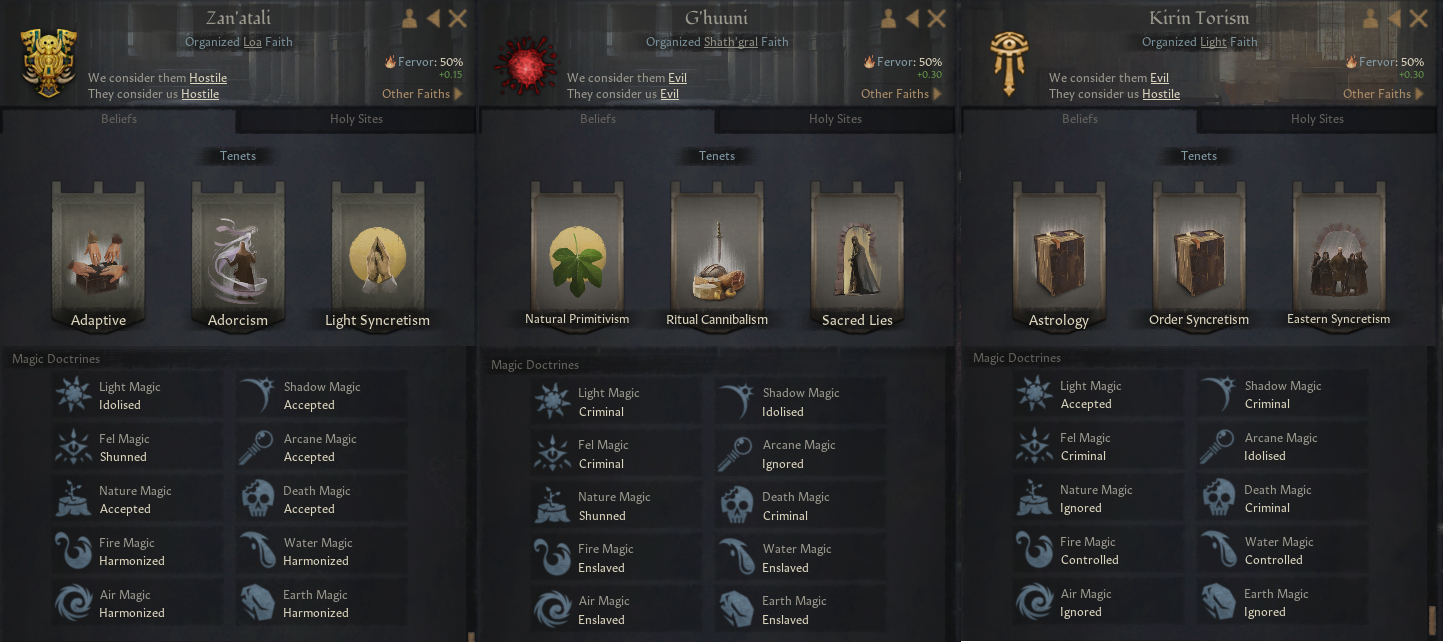
Traits
We have a lot of plans, for now we added 8 new traits, 6 of which are congenital, to represent sorcerers - mages gifted from birth, in contrast to wizards that need to learn how to wield magic. Aside from a small bonus to learning magic a bit faster, sorcerers will receive a large pool of mana, increased mana regeneration, and bonus to Mana Conductivity for prowess conversion to represent their innate battle spells.
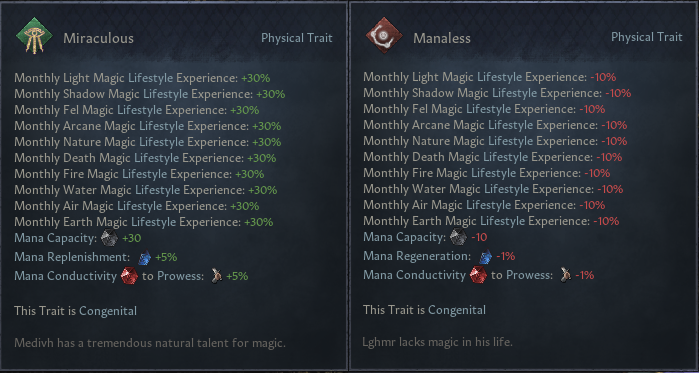
What’s next?
That's all for today! We will keep designing magic lifestyles, adding new spells so we can show our progress later. As always, if you have any feedback, feel free to share it. If you like what we're doing, consider supporting us on Patreon. If you have free time and wish to bring the release closer, we would like to Recruit you. Thanks for reading and thank you for your continued support! Until next time!
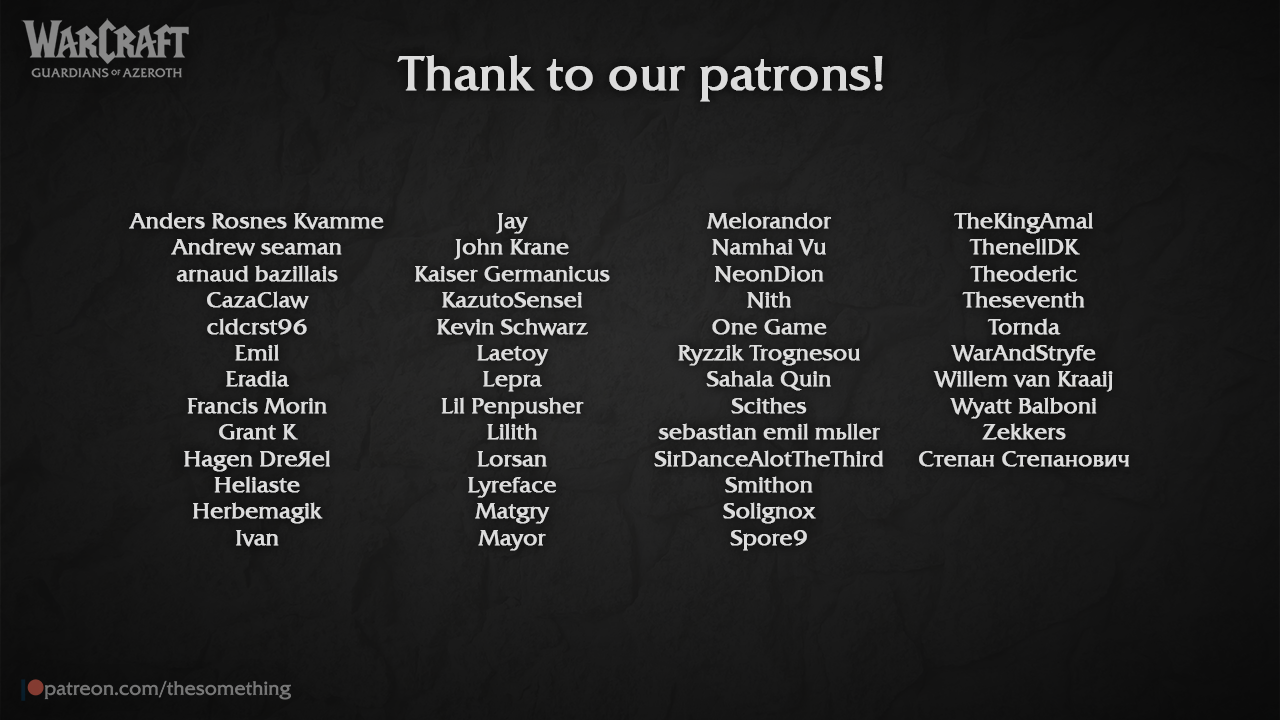



👏👏👏
To be honest magic in Warcraft is confusing to me, as a consequence of the ever changing lore, and all of the stuff being added with every new WoW expansion, there's all of these layers to everything, and they seem unneeded at times, for example: Death, Shadow and Fel magic are distinct things, despite all of them being flavors of what would be traditionally seen as just "black magic", and despite the line between them being kind of blurry at times; Light and Life sound very similar when described, but they represent different (albeit similar?) facets of the fabric of the universe and are worshiped by different people; a dark shaman could be interpreted as a Fel warlock or an Arcane mage, if you change the phrasing on how they use magic, I mean they are all manipulating the elements without asking for permission, unlike the Shamans, but I guess the methods differ enough for them to be considered different schools of magic.
It's all very convoluted from my perspective, but regardless of that you folks have done a great job representing that system in this game, in a way that is faithful to the source material and gives players something else to dive into, and as you said, it's entirely optional, so I guess I don't have to hurt my head trying to understand all of it lol. Cool stuff.
This comment is currently awaiting admin approval, join now to view.
The way I see it is this:
Shamanism (both 'light' and dark) get their magic from elementals and spirits, with dark shamans forcing elementals and spirits into submission while 'light' shamans ask for their aid, and could very well be denied.
Arcane magic utilizes ley lines and the lifeblood of Azeroth herself to generate the desired effects, by using verbal, somatic, and possibly even material components and channeling arcane through themselves to create the spells.
Death, Shadow, and Fel magic would arguably fall under the blanket category of Black Magic, however their source of power is different. Death magic is anything that would fall under the category of necromancy. It pertains to Death, and everything directly related to it. Shadow magic is derived from the shadow plane, and its inhabitants, and Fel magic is derived from the Twisting Nether. So while they would all be considered Black Magic, it is still important to differentiate between the different types of Black Magic, as each type has its own source and potential drawbacks.
In terms of the difference between Light and Life, while I am not entirely certain and could very well be incorrect, I do believe the difference between them is Light magic is just that: Light magic. It is derived from whatever Holy entity it is that grants Paladins and priests their abilities, like the Naruu (who are beings of pure holy energy). Life magic has is roots (pun intended) in Nature magic. Their uses most certainly do overlap, but just as the 'black' magics, there is a very important distinction in the form of that magic's origin.
That is a pretty good deconstruction. Thank you for the input, it's something to think about.
Some stuff I was wondering about: how do dark shamans enact their influence over nature?
The confusing thing about necromancy in warcraft, is that it is said to be like... binding a soul back to a body, in a way that gives the reanimator influence over their will, which if I'm not mistaken (at least when I last read about this stuff) is considered shadow magic. Shadow magic, in turn, is the negative manipulation of the soul and flesh, in opposition to light being related to the empowerment of the flesh and soul, they are two sides to the same coin and all, so necromancy and shadow magic kind of blur, at least as far as I know.
This comment is currently awaiting admin approval, join now to view.